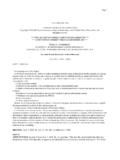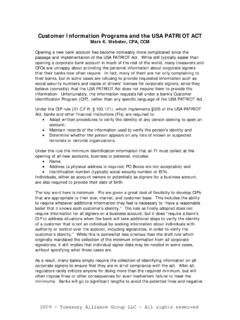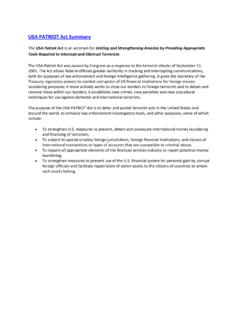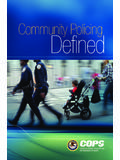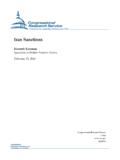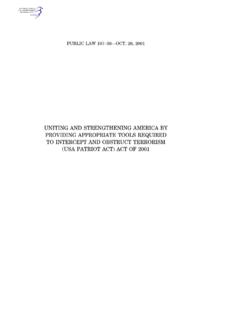Transcription of Bank Secrecy Act Examination Procedures Sections …
1 bank Secrecy Act Examination Procedures Sections 313, 314, and 319(b) of the USA patriot Act (31 CFR , , , )Table of Contents Correspondent Accounts for Foreign Shell Banks and Recordkeeping ( Sections 313 and 319(b)) Introduction..1 Request Letter Items.. 3 Examination Procedures .. 3 Special Information-Sharing Procedures to Deter Money Laundering and Terrorist Activity ( section 314(a) and 314(b)) Introduction Information Sharing Between Law Enforcement and Financial Institutions ( section 314(a)) .. 5 Voluntary Information Sharing ( section 314(b)) .. 6 Request Letter Items.. 7 Examination Procedures for section 314(a) .. 8 Examination Procedures for section 314(b).
2 9 OCC 2003-43 Attachment 1 Examination Procedures bank Secrecy ACT Correspondent Accounts for Foreign Shell Banks; Recordkeeping and Termination of Correspondent Accounts for Foreign Banks Introduction On October 28, 2002, a final regulation implementing Sections 313 and 319(b) of the USA patriot Act became effective (31 CFR and ). The regulation implemented new provisions of the bank Secrecy Act (BSA) that relate to foreign correspondent accounts. section 31 CFR prohibits a covered financial institution (CFI) from establishing, maintaining, administering, or managing a correspondent account1 in the United States for, or on behalf of, a foreign shell bank .
3 A foreign shell bank is defined as a foreign bank without a physical presence in any An exception, however, permits a CFI to maintain a correspondent account with a foreign shell bank that is a regulated This section also requires that a CFI take reasonable steps to ensure that a correspondent account for a foreign bank is not being used indirectly to provide banking services to foreign shell banks. A CFI that maintains a correspondent account in the United States for a foreign bank must also maintain records in the United States identifying the owners of each foreign bank . 4 A CFI must also record the name and street address of a person who resides in the United States and who is authorized, and has agreed, to be an agent to accept service of legal process.
4 The Department of the Treasury, working with the industry and federal bank regulatory and law enforcement agencies developed a certification process to assist CFIs with compliance. This process included developing certification and recertification forms. While the use of these forms is not required, a CFI will be deemed to be in compliance with this regulation if it obtains at least 1 For purposes of this regulation, a correspondent account is an account established by a covered financial institution for a foreign bank to receive deposits from, to make payments or other disbursement on behalf of a foreign bank , or to handle other financial transactions related to the foreign bank .
5 An account means any formal banking or business relationship established to provide regular services, dealings, and other financial transactions, and includes a demand deposit, savings deposit, or other transaction or asset account and a credit account or other extension of credit. 2 Physical presence means a place of business that: Is maintained by a foreign bank ; Is located at a fixed address (other than solely an electronic address or a post-office box) in a country in which the foreign bank is authorized to conduct banking activities, at which location the foreign bank : Employs one or more individuals on a full-time basis; and Maintains operating records related to its banking activities; and Is subject to inspection by the banking authority that licensed the foreign bank to conduct banking activities.
6 3 A regulated affiliate is a shell bank that is affiliated with a depository institution, credit union, or foreign bank that maintains a physical presence in the United States or in another jurisdiction. The regulated affiliate shell bank must also be subject to supervision by the banking authority that regulates the affiliated entity. 4 To minimize the recordkeeping burdens, ownership information is not required for foreign banks that file a form FR-7 with the Federal Reserve or for those that are publicly traded. Publicly traded refers to shares that are traded on an exchange or an organized over-the-counter market that is regulated by a foreign securities authority as defined in section 3(a)(50) of the Securities Exchange Act of 1934.
7 OCC 2003-43 Attachment 2 once every three years, a certification or recertification form from the foreign bank (see ) The regulation also contains specific provisions as to when CFIs must obtain the required information or close correspondent accounts. CFIs must obtain certifications (or recertifications) or otherwise obtain the required information within 30 calendar days after the date an account is established and at least once every three years thereafter. (For accounts in existence on October 28, 2002, initial certifications should have been obtained by March 31, 2003.) If the CFI is unable to obtain the required information, it must close all correspondent accounts with the foreign bank within a commercially reasonable time.
8 Should a CFI, at any time, know, suspect, or have reason to suspect that any information contained in a certification (or recertification) or that any other information relied upon is no longer correct, the CFI must request that the foreign bank verify or correct such information, or take other appropriate measures to ascertain its accuracy. Therefore, financial institutions should review certifications for potential problems that may warrant further review such as use of post office boxes or forwarding addresses. If the CFI has not obtained the necessary or corrected information within 90 days, it must also close the account within a commercially reasonable time. During this period, the CFI may not permit the foreign bank to establish any new financial positions or execute any transactions through the account, other than those transactions necessary to close the account.
9 Also, a CFI may not establish any other correspondent account for the foreign bank until it obtains the required information. A CFI must also retain the original of any document provided by a foreign bank and the original or a copy of any document otherwise relied upon for the purposes of this regulation for at least five years after the date that the CFI no longer maintains any correspondent account for the foreign bank . Under 31 CFR , the Secretary of the Treasury or the Attorney General may issue a subpoena or summons to any foreign bank that maintains a correspondent account in the United States and may request a CFI to produce records relating to that account, including records maintained abroad, relating to the deposit of funds into the foreign bank .
10 Upon receipt of a written request from a federal law enforcement officer, a CFI must produce the required records within seven days (31 CFR ). The Secretary of the Treasury or the Attorney General may also, by written notice, direct a CFI to terminate its relationship with a foreign correspondent bank that has failed to comply with a subpoena or summons or that has failed to initiate proceedings to contest a subpoena or summons. If a CFI fails to terminate the correspondent relationship within 10 days of receipt of notice, it could be subject to a civil money penalty of up to $10,000 per day until the correspondent relationship is terminated. Also, upon request by the financial institution s federal regulator, a financial institution must provide or make available records related to anti-money-laundering (AML) compliance within 120 hours.
